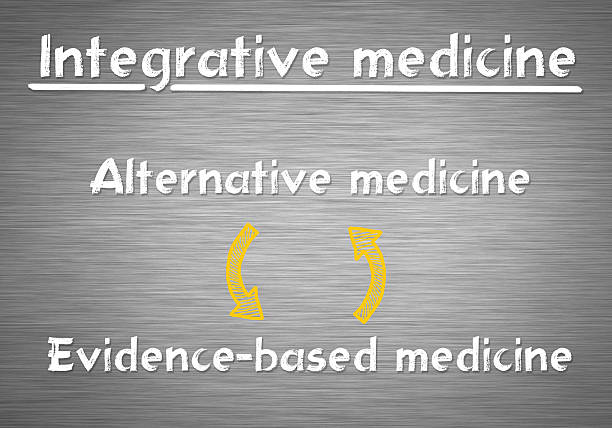Are you or someone you care about dealing with the challenges of chronic diseases?
The daily battle against symptoms, the rounds of medication, and the relentless doctor visits are a constant struggle.
But what if there were a different approach, one that not only addressed your symptoms but considered the entirety of your well-being?
Welcome to the world of integrative medicine, where a holistic, patient-centered approach can transform how you manage chronic diseases.
In this blog post, I’ll show you the incredible benefits of choosing integrative medicine as part of your healthcare journey.
What Is Integrative Medicine?
Integrative medicine is a type of healthcare approach that combines evidence-based complementary and alternative medicine practices with traditional medical care.
It aims to focus on the whole person through collaboration among healthcare professionals to provide personalized, holistic, and evidence-based treatment plans.
Integrative medicine recognizes that a person’s health can be influenced by various factors, including physical, emotional, social, and environmental factors. So, it seeks to promote overall wellness by integrating all these factors into its treatment plan for each patient.
Integrative Medicine versus Functional Medicine
Integrative medicine and functional medicine are holistic approaches to healthcare, but they have distinct differences.
Where integrative medicine aims to address a patient’s overall well-being by considering physical, mental, and emotional aspects, functional medicine primarily addresses the underlying cause of a disease/condition.
Integrative medicine combines conventional medical treatments with complementary and alternative therapies; functional medicine might also combine these approaches, but the focus is different.

Functional medicine will invest more in diagnostic testing than medical treatments. It only decides on the medical treatment route when the disease’s root cause is known and focuses more on prevention than treatment.
While integrative medicine provides a broader range of therapeutic options and encourages patient involvement in care decisions, functional medicine takes a more in-depth and personalized approach, heavily relying on diagnostic testing to guide treatment.
The choice between the two depends on your specific health needs, preferences, and the extent to which you seek a specialized, comprehensive approach to healthcare.
RELATED POSTS:
Principles for Integrative Medicine
The principle of creating an integrative medical model for patient care goes beyond randomly choosing between traditional and alternative medicine. Integrative healthcare combines all safe and effective treatment methods to effectively treat chronic diseases without regard for whether these methods originated in modern medicine, pharmaceutical medicine, or complementary and alternative medicine.
Integrative doctors consider a wide range of sensible and efficient options in their diagnosis and treatment, including education about lifestyle modifications and self-care.
Integrative medicine seeks to continuously improve healthcare by utilizing all scientifically valid healing methods rather than arbitrarily rejecting conventional medicine or unquestioningly accepting complementary and alternative medicine.
Types of Integrative Medicine for Chronic Diseases
Here are some types of integrative medicine:
a. Mindfulness-based stress reduction
Mindfulness-based stress reduction (MBSR) is a complementary practice in integrative medicine where you are taught mindfulness meditation techniques, body awareness exercises, and gentle yoga practices.
These methods help you become more aware of your thoughts, emotions, and bodily sensations, especially during stressful situations.
Through regular practice, MBSR aims to cultivate mindfulness skills that can be applied to everyday life; this application ultimately helps to reduce stress and promote a sense of calm and balance.
b. Cognitive behavioral therapy
Cognitive behavioral therapy (CBT) is a form of integrative medicine widely practiced. It focuses on the mind-body connection and the interplay between your thoughts, emotions, behaviors, and physical well-being.
CBT is based on the idea that your thoughts and beliefs influence your emotions and behaviors. In CBT, you will work with trained therapists to identify and deal with the negative thought patterns you might have and cognitive disorders that may contribute to emotional distress, such as anxiety, depression, or stress.
Through this process, individuals learn to reframe their thoughts positively and constructively.
c. Herbal therapy
Herbal therapy, also known as herbal medicine or phytotherapy, is a prominent component of integrative medicine that embraces the healing properties of plants to promote health and well-being.
This approach uses various plant-based substances, such as herbs, roots, leaves, and flowers, for medicinal purposes. These may be consumed as teas, capsules, tinctures, or applied topically as creams or salves. Herbal therapy has a long history across cultures worldwide and has been used for centuries to treat various health conditions.
The choice of herbs is based on their known therapeutic properties, which have been studied and documented over time. However, it’s crucial to note that the safety and effectiveness of herbal remedies can vary, and not all herbs are suitable for everyone or every condition.

Benefits of Integrative Medicine for Chronic Diseases
Here are the top benefits of integrative medicine in the treatment of chronic diseases:
1. Personalized approach
Integrative medicine recognizes that each person’s experience with a chronic disease is unique. It tailors treatment plans to each person, considering their needs, preferences, and values. This personalization can lead to more effective patient-centered care, as treatments are designed to align with your goals and priorities.
2. Comprehensive assessment
Integrative medicine emphasizes thorough assessments beyond just the physical symptoms of your condition. It considers your complete medical history, including past treatments, goals, responses, and lifestyle factors such as diet, exercise, sleep, and stress levels.
This holistic approach helps identify potential underlying causes and contributors to the chronic condition.
3. Reduced side effects based on drugs
One of the key advantages of integrative medicine for chronic diseases is its potential to reduce the side effects associated with conventional medications.
Integrative approaches often incorporate complementary therapies, such as acupuncture, herbal remedies, or dietary changes, which may help manage symptoms or decrease the dosage of pharmaceutical drugs.
This can lead to fewer adverse effects, enhancing your overall well-being.
4. Improved quality of life
Integrative medicine strongly emphasizes enhancing the overall quality of life for anyone with chronic diseases.
Beyond managing symptoms and disease progression, it addresses the broader aspects of well-being, including mental health, emotional resilience, and social support.
This comprehensive approach can lead to a more fulfilling and satisfying life despite a chronic condition.
5. Improved patient-doctor relationship
Integrative medicine fosters a stronger and more collaborative relationship between patients and healthcare providers. Doctors who practice integrative medicine often spend more time with patients, listening to their concerns and involving them in decision-making.
This patient-centered approach builds trust, encourages open communication, and empowers you to participate in your care actively, improving treatment outcomes and greater satisfaction.

6. Reduced the risk of progression
By identifying and managing risk factors such as diet, exercise, and stress levels, integrative medicine can help slow down the progression of the disease and reduce the likelihood of complications.
Integrative medicine also focuses on early intervention, which can be crucial in preventing the advancement of chronic conditions and maintaining stability in the patient’s health.
7. Embraces holistic treatments for mental health
Integrative medicine recognizes the crucial connection between physical and mental health. For individuals with chronic diseases, mental health issues such as depression, anxiety, and stress are common and can significantly impact their overall well-being.
Integrative medicine incorporates a range of holistic treatments to address mental health concerns, including mindfulness-based stress reduction, counseling, relaxation techniques, and even art or music therapy.
These approaches complement conventional treatments and provide effective tools for managing mental health symptoms.
8. Allows you to participate in your treatments actively
Integrative medicine encourages you to take an active role in your treatment. You will be actively involved in decision-making and goal-setting. This helps you develop a sense of ownership over your health and encourages you to engage in self-care practices.
Active participation can lead to a more positive outlook on your health, increased motivation to adhere to treatment plans and greater control over your mental health.
CONCLUSION
As you ponder integrative medicine’s benefits, remember that your well-being is at the center of this approach.
It’s more than just managing symptoms; it’s about enhancing your quality of life, empowering you to take control of your health, and fostering a profound sense of well-being.
Your journey toward better health doesn’t have to be a solo mission. Integrative medicine will support you every step of the way, embracing your uniqueness and offering a comprehensive path to wellness.
So, consider these benefits, consult with healthcare professionals, and embark on a healthcare journey that places your health, your whole self, at the forefront. Your well-being deserves nothing less.
Do you currently include integrative medicine in your chronic disease management strategy?
READ ALSO: 10 Important Self-Advocacy Skills for Adults with Chronic Illness




0 Comments